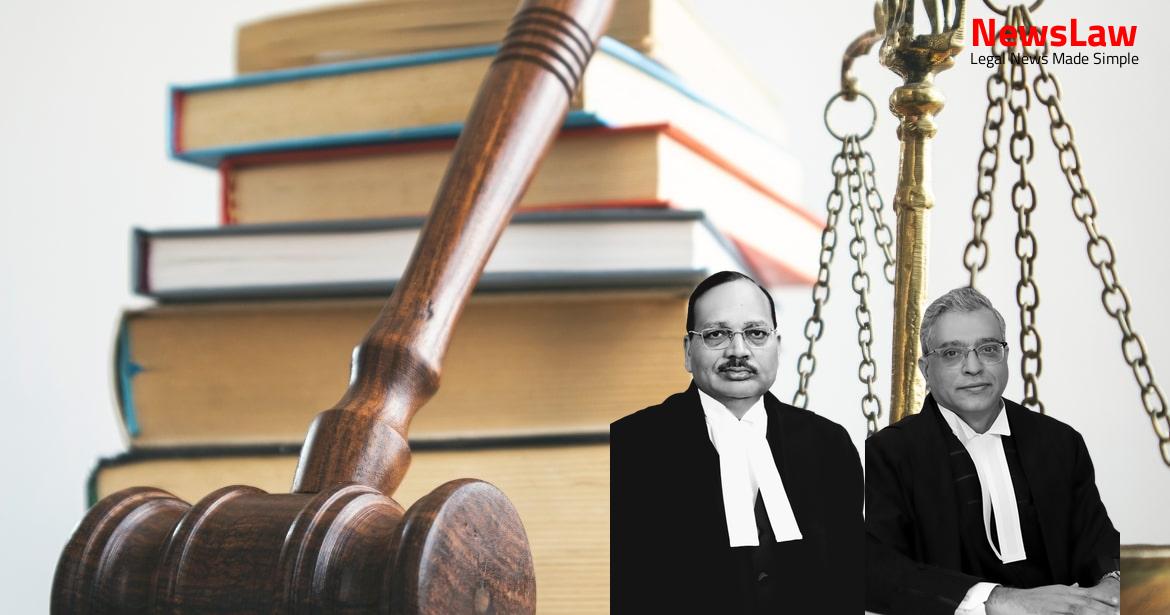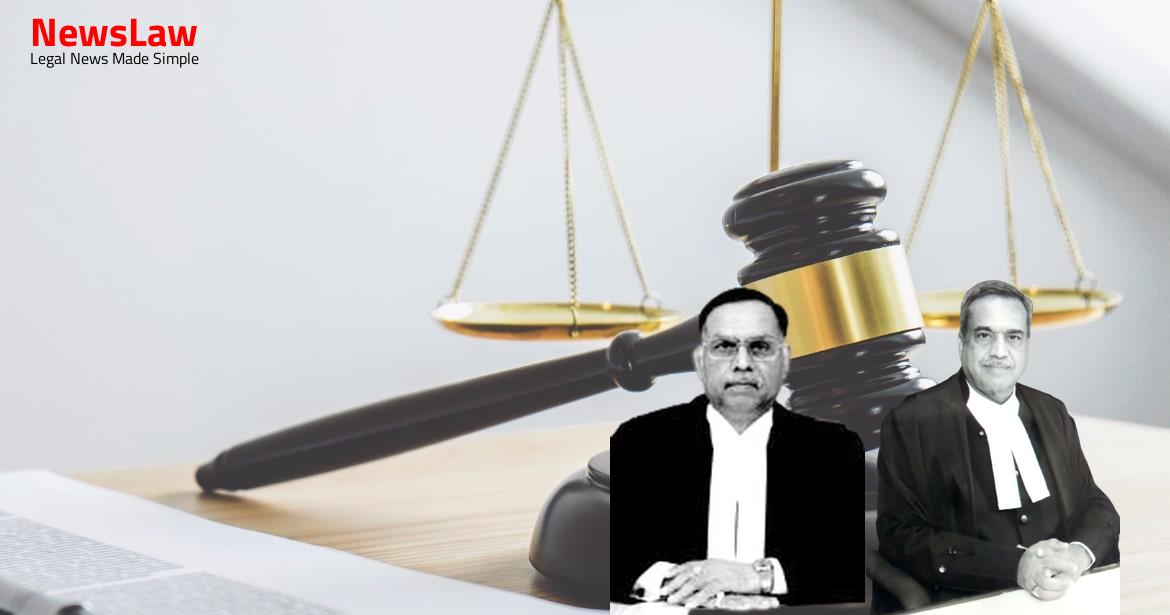If the Appellant No 1 was entitled to ‘Sit’ as a member on 19.06.2023, then the No Confidence Motion against Appellant No.2 cannot ‘Stand’, to deploy a Denning- esque phrase. If Appellant No 1 is held not to be entitled to the benefit of Section 3 of the Temporary Extension Act, 2023, then he would be deemed to have vacated his seat and consequently, the No Confidence Motion would stand carried. On 30.12.2020, the Appellant No 1 filed his nomination papers for contesting elections as a Member of the Panchayat of Village Jambulani, District Satara on a seat reserved for the OBC category. Under Section 6(2) of this Act, after obtaining the Caste Certificate from the Competent Authority, any person, desirous of availing of the benefits or concessions provided to the said caste, is authorized to make an application, well in time, in such form and in such manner as may be prescribed to the concerned Scrutiny Committee for the verification of such Caste Certificate and issue of a Validity Certificate. Rule 14 sets out that any person desirous of availing of the benefits and concessions provided to the reserved category shall submit an application in the prescribed form with an affidavit to the concerned Scrutiny Committee for verification of his caste claim and issuance of Caste Validity Certificate well in time. Sub-Rules 1 to Sub- Rules 3 of Rule 17 are extracted herein below: “17 (1) On receipt of application, the Scrutiny Committee shall ensure that the application and the information supplied therewith is complete in all respects and to carry out scrutiny of the application. (2) Notwithstanding anything contained in these rules, the claimant or applicant or complainant shall be personally responsible for removal of objections raised by Scrutiny Committee, if any, within two weeks or within such extended period, which shall not be more than six weeks, failing which the claim or application or complaint shall be disposed of, by appreciating available records and such decision may be communicated to the applicant by the Scrutiny Committee. Sub-
Also Read: https://newslaw.in/supreme-court/courts-analysis-in-disciplinary-case/
Rule 3 of Rule 17 categorically states that incomplete application may be rejected by recording reasons.
– Every person desirous of contesting election to a seat reserved for Scheduled Castes, Scheduled Tribes or, as the case may be, Backward Class of Citizens, shall be required to submit, alongwith the nomination paper, Caste Certificate issued by the Competent Authority and the Validity Certificate issued by the Scrutiny Committee in accordance with the provisions of the Maharashtra Scheduled Castes, Scheduled Tribes, De-notified Tribes (Vimukta Jatis), Nomadic Tribes, other Backward Classes and Special Backward Category (Regulation of Issuance and Verification of) Caste Certificate Act, 2000: Provided that, for the General or by-elections for which the last date of filing of nomination falls on or before the 31 December 2023, in accordance with the election programme declared by the State Election Commission, a person who has applied to the Scrutiny Committee for verification of his Caste Certificate before the date of filing of the nomination papers but who has not received the Validity Certificate on the date of filing of the nomination papers shall submit, along with the nomination papers, – (i) a true copy of the application preferred by him to the Scrutiny Committee for issuance of the Validity Certificate or any other proof of having made such In view of the above provision, every person desirous of contesting election to a membership in the reserved category, shall submit alongwith the nomination paper, Caste Certificate issued by the Competent Authority and the Validity Certificate issued by the Scrutiny Committee in accordance with Caste Certificate Act, 2000. This judgment of the Full Bench was affirmed by this Court in the case of Shankar S/o Raghunath Devre (Patil)
Vs.
In case of Sujit Vasant Patil (supra), the Full Bench of this Court, in the context of inter play between similar Municipal Legislations and the Caste Act, 2000, has held that the legislature expects a person to claim benefit of contesting to a reserved post only after obtaining Validity Certificate from the Scrutiny Committee, though it also permits a person to claim such benefit on the basis of a tentative caste certificate issued by the Competent Authority, if such a person is willing to take the risk. Thus the scheme is that a person who obtains a caste certificate has to himself apply to the Scrutiny Committee for scrutiny of his caste certificate, so that he can secure a valid certificate from the Scrutiny Committee, and it is only after the Scrutiny Committee issuing a valid certificate that the caste certificate issued in favour of the person by the Competent Authority becomes final.
According to Sujit Vasant Patil (supra), therefore, a person who seeks to contest election to reserved posts without compliance with the general rule of producing Validity Certificate along with nomination papers, ‘ takes a risk ’. Otherwise, such person, will avail of a conditional con- cession, without, fulfilling the condition subject to which such concession came to be granted in the first place by the provision.” The Legislature expects a person claiming the benefit of contesting in a reserved post to be in possession both the Caste Certificate and the Validity Certificate at the time of filing the nomination. … If the legislature, for a limited period of time, taking into consideration pendency of applications for issuance of Validity Certificate before the Scrutiny Committee grants some exemptions or concession to persons who have applied for issue of Validity Certificate before the date of filing nomination papers, but who have not received such Validity Certificate on the date of filing of nomination papers, subject to such persons producing the Validity Certificate “ within period of six months from the date of election ”, there is no reason to treat the stipulation as to time has (sic.) merely directory and thereby enlarge or extend the exemption or the concession granted by the legislature.
Instead, in this case, and perhaps, for good reason, the legislature has consciously deemed it appropriate to insist that the person submits an undertaking that he shall produce the Validity Certificate within six months and further, the legislature, in clear, unambiguous and express terms has provided that upon the failure of such person to produce the Validity Certificate within six months from the date of election, his election shall be deemed to have been retrospectively terminated and he shall be disqualified for being a Councillor. In essence, this Court would be rewriting the statute on the basis of its own value judgments or notions of equity and inequity.” After holding that the provision is mandatory, the Full Bench held that failure to produce the Validity Certificate from the Scrutiny Committee within the stipulated time would mean that the election was deemed to have been terminated retrospectively and the person was to be disqualified. In the result, we hold that the time limit of six months prescribed in the two provisos to section 9-A of the said Act, within which an elected person is required to produce the Validity Certificate from the Scrutiny Committee is mandatory.” Further, in terms of second proviso to section 9-A if a person fails to produce Validity Certificate within a period of six months from the date on which he is elected, his election shall be deemed to have been terminated retrospectively and he shall be disqualified for being a Councillor.
To consider whether the Appellant No 1 is entitled to the protection of the Temporary Extension Act, 2023, it is necessary to recapitulate the facts of the present case. As per the read No 2 and 3 above the elected candidates in local bodies, municipal councils and corporations from reserved seats, have to submit their cast verification certificate within one year from the election. Hence this proposal has been filed as per the provisions of Rules 17(2)(3) of Maharashtra Rules of verification of caste certificate SC, ST, OBC, Spl BC 2012.” It is clear from the operative portion of the order that since the elected candidates have not submitted the notification of being elected, in time, the office was not able to take any decision in that regard. Shri Satyajit Dighe, learned counsel for the Petitioner rightly submitted that impugned order of the Caste Scrutiny Committee was passed almost on the last day of twelve months mandatory period and therefore, no time was left for approaching this Court which is the only remedy available i.e. (ii) All the District Caste Scrutiny Committees are directed to dispose of the matters which are covered by the mandatory period of twelve months as provided in Section 10-1A and Section 30(1A) of the Maharashtra Village Panchayat Act, 1959, Section 9A of the Maharashtra Municipal Councils, Nagar Panchayat and Industrial Townships Act 1965, in Section 5-B of the Mumbai Municipal Corporation Act, 1888 and Section 5- B of the Maharashtra Municipal Corporation Act, 1949 as expeditiously as possible and in any case within a period of eight months subject to following conditions: (a) The concerned successful candidate who has applied for getting caste certificate validated to convey his election result and this order to the relevant District Caste Scrutiny Committee personally or through his Advocate within a period of two weeks from the date of declaration of the result of his election and pointing out to the Committee the aforesaid time period of twelve months as provided in the aforesaid provisions with a request to expedite the hearing and to complete the proceedings within the time prescribed in this judgment.
Also Read: https://newslaw.in/supreme-court/invalid-appointment-and-manipulation-in-a-school/
(iii) The Chief Secretary of the State of Maharashtra is directed to circulate to all the District Caste Scrutiny Committees copy of this judgment within a period of 30 days from today.” It is obvious from the above directions issued on 27 October, 2020 (well before the Appellant No 1 filed the application for the Validity Certificate on 30.12.2020) that within two weeks from the declaration of the result the successful candidate from the reserved seats was obligated to convey his election result and the order and the judgment of the High Court to the relevant Caste Scrutiny Committee. The candidate was also to point out the aforesaid time limit and request for an expeditious hearing and completion of proceeding within the said period. The provisions of Sections 3 and 4 of the Temporary Extension Act, 2023, along with its Statement of Objects and Reasons, are set out and analyzed in the later part of the judgment. If the Appellant No.1 was not entitled to sit, then the total number of members would be ten and eight members voting would constitute 80%. – (1) A motion of no confidence may be moved by not less than two third of the total number of the members who are for the time being entitled to sit and vote at any meeting of the panchayat against the Sarpanch or the Upa-Sarpanch after giving such notice thereof to the Tahsildar as may be prescribed. 1 to 8 filed a Writ Petition before the High Court praying that the No Confidence Motion against Appellant No 2 be declared to be duly and validly carried, and for consequential directions directing the Appellant Prayer (a) and (b) of the Writ is as under: (a) By suitable writ, order or direction this Hon’ble Court may be pleased to hold and declare that the no confidence motion against the present Respondent No 3 moved by the Petitioners on 13/06/2023 has been duly and validly carried with the requisite majority in the special meeting conveyed by the Respondent No 2 and held on 19/06/2023 and consequently the direction be issued to the Respondents that the Respondent No 3 shall forthwith stop exercising all the powers, functions and duties as the Sarpanch in the village Panchayat Jambulani Taluka Man, District Satara and thereafter, further direction be issued to the Respondent (b) By suitable writ, order or direction the declaration made by the Respondent No 2 in the special meeting held on 19/06/2023 and as recorded in the minutes of the said meeting declaring that the no confidence motion against the Respondent No 3 has failed be quashed and set aside. Learned counsel contends that under Section 35(3) of the Maharashtra Village Panchayats Act, a No Confidence Motion has to be carried by a majority of not less than three- fourth of total number of Members who are for the time being entitled to sit and vote.
Aniruddha Joshi, learned counsel for the Respondent authorities, have contended that the Appellant No 1 is not entitled to the benefit of Section 3 of the Temporary Extension Act, 2023 as that Section will apply only to a person who has applied to the Scrutiny Committee for verification of his Caste Certificate before the date of filing the nomination papers and who is elected on the reserved seat but whose application is pending before the Scrutiny Committee on 10.07.2023, the date of commencement of the Temporary Extension Act, 2023.
( 1 )
Notwithstanding anything contained in sections 10-1A and 30-1A of the Maharashtra Village Panchayats Act and sections 12A, 42 and 67 of the Maharashtra Zilla Parishads and Panchayat Samitis Act, 1961, for contesting General or bye-elections to the Village Panchayats, Zilla Parishads and Panchayat Samitis which were held on or after 1st January 2021 and till the date of commencement of this Act,— ( a ) a person, who has applied to the Scrutiny Committee for verification of his Caste Certificate before the date of filing of the nomination papers and who is elected on the reserved seat of a member or Sarpanch of Village Panchayat, Councillor or President of Zilla Parishad or member or Chairman of Panchayat Samiti, but whose application is pending before the Scrutiny Committee on the date of commencement of this Act, shall submit his Validity Certificate within a period of twelve months from the date of commencement of this Act ; And ( b ) a person, whose election has been terminated or deemed to have been terminated or a person who is disqualified for being a member or Sarpanch of Village Panchayat, Councillor or President of Zilla Parishad or member or Chairman ( 2 ) The provisions of sub-section ( 1) shall not be applicable,— ( a ) where bye-elections have been held on the seats specified in sub-section ( 1) before the date of commencement of this Act ; or ( b ) where a member whose application of Validity Certificate has been rejected by the Scrutiny Committee.
The abovementioned sections of the said Acts are amended with a view to allow the persons, desirous of contesting for such reserved seats in certain general or bye-elections and have applied to the Scrutiny Committee for obtaining Validity Certificate, to submit the Validity Certificate within twelve months from the date on which they were declared elected. However, due to pending applications of such members before Scrutiny Committees more than seven thousand duly elected members were disqualified or might be disqualified for not submitting Validity Certificates for no fault of their own. As both Houses of the State Legislature were not in session and the Governor of Maharashtra was satisfied that circumstances existed which rendered it necessary for him to take immediate action to make a law, for the purposes aforesaid, the Maharashtra Temporary Extension of Period for Submitting Validity Certificate (for certain elections to Village Panchayats, Zilla Parishads and Panchayat Samitis) Ordinance, 2023 (Mah.
It clearly provides that it covers the cases of persons who have applied to the Scrutiny Committee for verification of his Caste Certificate before the date of filing of the nomination papers and who are elected on the reserved seat; and whose applications are pending before the Scrutiny Committee on the date of commencement of the Act. Sub-clause (b) states that a person whose election has been terminated or deemed to have been terminated or a person who is disqualified for being a Member or Sarpanch for not submitting the Validity Certificate within the period specified in the sections mentioned above (10-1A and 30-1A), shall be deemed to be and shall be continued to be a member or Sarpanch and shall not be disqualified till the period of twelve months. The Validity Certificate has to be obtained within the time provided, whether by the original statute or by the Temporary Extension Act. Thus, if even the mischief rule of interpretation, the oldest interpretation doctrine by far, [ Heydon’s case, 1584, 76 ER 637] is adopted for the purposes of the Maharashtra Village Panchayats Act, 1959 and the Temporary Extension Act, it is clear that defective or incomplete applications that result in a rejection are no different from a rejection on merits. Besides, this undertaking is legally backed by the judgment in Mandakani Kachru Kokane (supra), which no doubt gave two weeks from the date of declaration of the result for communication of the declaration to the Scrutiny Committee.
On the facts of the case, the question is, would the order of 01-03.04.2021 tantamount to a rejection under Section 3(2)(b) of the Temporary Extension Act, 2023 so as to dis-entitle Appellant No.1 from the benefit of Section 3. Ulahalkar (supra) while reiterating the holding in Sujit Vasant Patil (supra), ordinarily, the rule is for an aspiring candidate in an election to submit the Caste Certificate and the Validity Certificate along with the nomination. Further and independent of the above, Mandakani Kachru Kokane (supra) which came on 27.10.2020 well before the Appellant No.1 filed his nomination clearly mandated that there was an obligation on the applicants before the Scrutiny Committee to furnish the declaration of the results within two weeks of the declaration of the results for expeditious disposal. To hold that – in spite of the Appellant No.1 not doing everything required to be done, and which were under his control to do – his application before the Caste Certificate Scrutiny Committee was still pending on 10.07.2023 for the purposes of Section 3 of the Temporary Extension Act, 2023, would be letting the Appellant No.1 take advantage of his own wrong. Sub- section (1)(b) of Section 3 of the Temporary Extension Act, 2023 only revives the membership of those, whose applications are pending by enacting a deeming provision, since they are now given a further period of twelve months from 10.07.2023 to furnish the Validity Certificate. The protective umbrella of Section 3 of the Temporary Extension Act, 2023 will not be available to Appellant No.1 since he is hit by Section 3(2)(b), for the reason that there was no valid application pending on the date of the commencement of the said Act. The Appellant No.1 may take the benefit of the validity certificate issued to him on 12.07.2023, pursuant to his second application of 14.06.2023, for sustaining his Caste Certificate issued by the Competent Authority on 03.02.2013, for contesting in future elections and for claiming other concessions as may be available in law. The net result is that the High Court was right in setting aside the rejection of the No Confidence Motion and in holding that the No Confidence Motion against Appellant No
Case Title: SUDHIR VIKAS KALEL Vs. BAPU RAJARAM KALEL (2024 INSC 90)
Case Number: C.A. No.-001776-001776 / 2024



